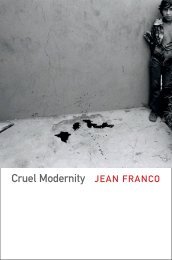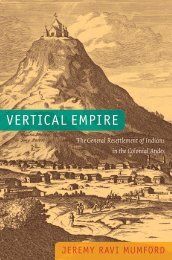Spring 2013 Catalog - Duke University Press
Spring 2013 Catalog - Duke University Press
Spring 2013 Catalog - Duke University Press
Create successful ePaper yourself
Turn your PDF publications into a flip-book with our unique Google optimized e-Paper software.
Adiós Niño<br />
The Gangs of Guatemala City<br />
and the Politics of Death<br />
deborah t. levenson<br />
“I was blown away by this book, by its originality, textured detail, and<br />
penetrating, multilayered analysis of the history of Guatemalan gangs.<br />
The most holistic work that I have read on so-called ‘apolitical’ gang<br />
violence in Latin America, it is at once deeply empathetic, even to people<br />
who have committed vicious acts, and sharply argumentative. Adiós Niño<br />
will have a big impact on Latin American studies, urban studies, and vio-<br />
lence and memory studies across the fields of history, anthropology, and<br />
sociology.”—GREG GRANDIN, author of Fordlandia: The Rise and Fall of<br />
Henry Ford’s Forgotten Jungle City and The Blood of Guatemala: A History<br />
of Race and Nation<br />
In Adiós Niño, Deborah T.<br />
Levenson examines transforma-<br />
tions in the Guatemalan gangs<br />
called Maras from their emergence<br />
in the 1980s to the early 2000s.<br />
A historical study, Adiós Niño<br />
describes how fragile spaces of<br />
friendship and exploration turned<br />
into rigid and violent ones in<br />
which youth, and especially young<br />
men, came to employ death as<br />
a natural way of living for the<br />
short period that they expected to<br />
survive. Levenson relates the stark<br />
changes in the Maras to global,<br />
national, and urban deterioration; transregional gangs that intersect<br />
with the drug trade; and the Guatemalan military’s obliteration of<br />
radical popular movements and of social imaginaries of solidarity.<br />
Part of Guatemala City’s reconfigured social, political, and cultural<br />
milieu, with their members often trapped in Guatemala’s growing prison<br />
system, the gangs are used to justify remilitarization in Guatemala’s<br />
contemporary postwar, post-peace era. Portraying the Maras as microcosms<br />
of broader tragedies, and pointing out the difficulties faced by<br />
those youth who seek to escape the gangs, Levenson poses important<br />
questions about the relationship between trauma, memory, and historical<br />
agency.<br />
Deborah T. Levenson is Associate Professor of History at Boston College.<br />
She is the author of Trade Unionists against Terror: Guatemala City, 1954–<br />
1985 and a coeditor of The Guatemala Reader: History, Culture, Politics, also<br />
published by <strong>Duke</strong> <strong>University</strong> <strong>Press</strong>.<br />
LATIN AMERICAN STUDIES/YOUTH AND VIOLENCE<br />
April 208 pages, 30 photographs<br />
paper, 978–0–8223–5315–7, $22.95/£14.99<br />
cloth, 978–0–8223–5299–0, $79.95/£60.00<br />
latin american / caribbean studies<br />
We Created Chávez<br />
A People’s History of the Venezuelan Revolution<br />
george ciccariello-maher<br />
“We Created Chávez provides a systematic, bottom-up approach to Venezuelan<br />
politics from 1958 to the present. It offers a much-needed new perspective<br />
on Hugo Chávez’s rise to power. Writing in a lively style and demonstrating a<br />
thorough command of the issues and personalities in recent Venezuelan history,<br />
George Ciccariello-Maher has produced a book essential to understanding the<br />
phenomenon of ‘Chavismo,’ which has attracted widespread interest throughout<br />
the world.”—STEVE ELLNER, author of Rethinking Venezuelan Politics: Class,<br />
Conflict, and the Chávez Phenomenon<br />
Since being elected president in 1998,<br />
Hugo Chávez has become the face of<br />
contemporary Venezuela and, more<br />
broadly, anticapitalist revolution.<br />
George Ciccariello-Maher contends<br />
that this focus on Chávez has obscured<br />
the inner dynamics and historical<br />
development of the country’s Bolivarian<br />
Revolution. In We Created Chávez,<br />
by examining social movements and<br />
revolutionary groups active before and<br />
during the Chávez era, Ciccariello-Maher<br />
provides a broader, more nuanced<br />
account of Chávez’s rise to power and<br />
the years of activism that preceded it.<br />
Based on interviews with grassroots organizers, former guerrillas, members<br />
of neighborhood militias, and government officials, Ciccariello-Maher presents<br />
a new history of Venezuelan political activism, one told from below.<br />
Led by leftist guerrillas, women, Afro-Venezuelans, indigenous people, and<br />
students, the social movements he discusses have been struggling against<br />
corruption and repression since 1958. Ciccariello-Maher pays particular<br />
attention to the dynamic interplay between the Chávez government, revolutionary<br />
social movements, and the Venezuelan people, recasting the<br />
Bolivarian Revolution as a long-term and multifaceted process of political<br />
transformation.<br />
George Ciccariello-Maher is Assistant Professor of Political Science at<br />
Drexel <strong>University</strong>.<br />
LATIN AMERICAN STUDIES/SOCIAL MOVEMENTS<br />
May 320 pages, 18 illustrations<br />
paper, 978–0–8223–5452–9, $24.95/£16.99<br />
cloth, 978–0–8223–5439–0, $89.95/£67.00<br />
29












